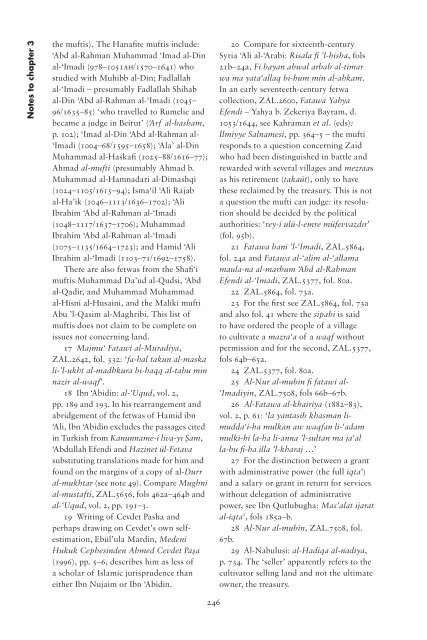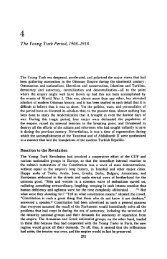Governing property, making the modern state - PSI424
Governing property, making the modern state - PSI424
Governing property, making the modern state - PSI424
You also want an ePaper? Increase the reach of your titles
YUMPU automatically turns print PDFs into web optimized ePapers that Google loves.
Notes to chapter 3<br />
<strong>the</strong> muftis). The Hanafite muftis include:<br />
‘Abd al-Rahman Muhammad ‘Imad al-Din<br />
al-‘Imadi (978–1051AH/1570–1641) who<br />
studied with Muhibb al-Din; Fadlallah<br />
al-‘Imadi – presumably Fadlallah Shihab<br />
al-Din ‘Abd al-Rahman al-‘Imadi (1045–<br />
96/1635–85) ‘who travelled to Rumelie and<br />
became a judge in Beirut’ (‘Arf al-basham,<br />
p. 102); ‘Imad al-Din ‘Abd al-Rahman al-<br />
‘Imadi (1004–68/1595–1658); ‘Ala’ al-Din<br />
Muhammad al-Haskafi (1025–88/1616–77);<br />
Ahmad al-mufti (presumably Ahmad b.<br />
Muhammad al-Hamnadari al-Dimashqi<br />
(1024–1105/1615–94); Isma‘il ‘Ali Rajab<br />
al-Ha’ik (1046–1113/1636–1702); ‘Ali<br />
Ibrahim ‘Abd al-Rahman al-‘Imadi<br />
(1048–1117/1637–1706); Muhammad<br />
Ibrahim ‘Abd al-Rahman al-‘Imadi<br />
(1075–1135/1664–1723); and Hamid ‘Ali<br />
Ibrahim al-‘Imadi (1103–71/1692–1758).<br />
There are also fetwas from <strong>the</strong> Shafi‘i<br />
muftis Muhammad Da’ud al-Qudsi, ‘Abd<br />
al-Qadir, and Muhammad Muhammad<br />
al-Hisni al-Husaini, and <strong>the</strong> Maliki mufti<br />
Abu ’l-Qasim al-Maghribi. This list of<br />
muftis does not claim to be complete on<br />
issues not concerning land.<br />
17 Majmu‘ Fatawi al-Muradiya,<br />
ZAL.2642, fol. 332: ‘fa-hal takun al-maska<br />
li-’l-ukht al-madhkura bi-haqq al-tabu min<br />
nazir al-waqf’.<br />
18 Ibn ‘Abidin: al-‘Uqud, vol. 2,<br />
pp. 189 and 193. In his rearrangement and<br />
abridgement of <strong>the</strong> fetwas of Hamid ibn<br />
‘Ali, Ibn ‘Abidin excludes <strong>the</strong> passages cited<br />
in Turkish from Kanunname-i liva-yı Şam,<br />
‘Abdullah Efendi and Hazinet ül-Fetava<br />
substituting translations made for him and<br />
found on <strong>the</strong> margins of a copy of al-Durr<br />
al-mukhtar (see note 49). Compare Mughni<br />
al-mustafti, ZAL.5656, fols 462a–464b and<br />
al-‘Uqud, vol. 2, pp. 191–3.<br />
19 Writing of Cevdet Pasha and<br />
perhaps drawing on Cevdet’s own selfestimation,<br />
Ebül’ula Mardin, Medeni<br />
Hukuk Cephesinden Ahmed Cevdet Paşa<br />
(1996), pp. 5–6, describes him as less of<br />
a scholar of Islamic jurisprudence than<br />
ei<strong>the</strong>r Ibn Nujaim or Ibn ‘Abidin.<br />
246<br />
20 Compare for sixteenth-century<br />
Syria ‘Ali al-‘Arabi: Risala fi ’l-hisba, fols<br />
21b–24a, Fi bayan ahwal arbab al-timar<br />
wa ma yata‘allaq bi-hum min al-ahkam.<br />
In an early seventeeth-century fetwa<br />
collection, ZAL.2600, Fatawa Yahya<br />
Efendi – Yahya b. Zekeriya Bayram, d.<br />
1053/1644, see Kahraman et al. (eds):<br />
İlmiyye Salnamesi, pp. 364–5 – <strong>the</strong> mufti<br />
responds to a question concerning Zaid<br />
who had been distinguished in battle and<br />
rewarded with several villages and mezraas<br />
as his retirement (takaüt), only to have<br />
<strong>the</strong>se reclaimed by <strong>the</strong> treasury. This is not<br />
a question <strong>the</strong> mufti can judge: its resolution<br />
should be decided by <strong>the</strong> political<br />
authorities: ‘rey-i ulü-l-emre müfevvazdır’<br />
(fol. 95b).<br />
21 Fatawa bani ’l-‘Imadi, ZAL.5864,<br />
fol. 24a and Fatawa al-‘alim al-‘allama<br />
maula-na al-marhum ‘Abd al-Rahman<br />
Efendi al-‘Imadi, ZAL.5377, fol. 80a.<br />
22 ZAL.5864, fol. 73a.<br />
23 For <strong>the</strong> first see ZAL.5864, fol. 73a<br />
and also fol. 41 where <strong>the</strong> sipahi is said<br />
to have ordered <strong>the</strong> people of a village<br />
to cultivate a mazra‘a of a waqf without<br />
permission and for <strong>the</strong> second, ZAL.5377,<br />
fols 64b–65a.<br />
24 ZAL.5377, fol. 80a.<br />
25 Al-Nur al-mubin fi fatawi al-<br />
‘Imadiyin, ZAL.7508, fols 66b–67b.<br />
26 Al-Fatawa al-khairiya (1882–83),<br />
vol. 2, p. 61: ‘la yantasib khasman limudda‘i-ha<br />
mulkan aw waqfan li-‘adam<br />
mulki-hi la-ha li-anna ’l-sultan ma ja‘al<br />
la-hu fi-ha illa ’l-kharaj …’<br />
27 For <strong>the</strong> distinction between a grant<br />
with administrative power (<strong>the</strong> full iqta‘)<br />
and a salary or grant in return for services<br />
without delegation of administrative<br />
power, see Ibn Qutlubugha: Mas’alat ijarat<br />
al-iqta‘, fols 185a–b.<br />
28 Al-Nur al-mubin, ZAL.7508, fol.<br />
67b.<br />
29 Al-Nabulusi: al-Hadiqa al-nadiya,<br />
p. 734. The ‘seller’ apparently refers to <strong>the</strong><br />
cultivator selling land and not <strong>the</strong> ultimate<br />
owner, <strong>the</strong> treasury.












